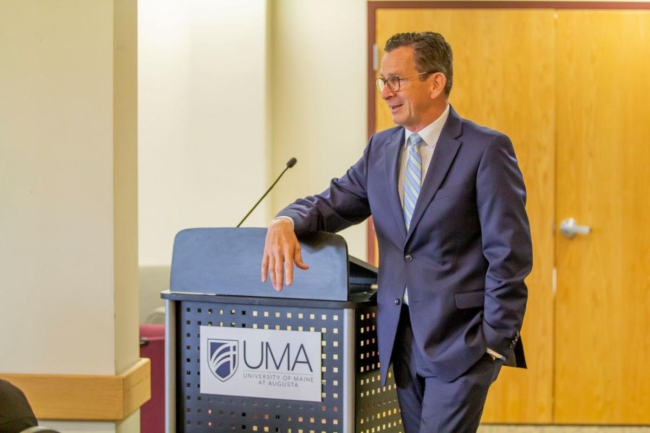You have /5 articles left.
Sign up for a free account or log in.

University of Maine system chancellor Dannel Malloy has faced scrutiny for withholding information in a prior presidential search at the University of Maine at Augusta.
Facebook/University of Maine at Augusta
The University of Maine at Augusta is set to begin its second presidential search in less than a year. The previous effort failed after officials withheld information about the selected candidate, ultimately leaving the position open and prompting fierce criticism of system leadership.
Now the University of Maine system, of which UMA is a part, will reboot the search—with some tweaks to the process and a chancellor in the hot seat for admitted missteps in the last search.
Faculty members argue that the changes are little more than window dressing, suggesting it’s not the processes that are the problem but rather the system officials who withheld information about Michael Laliberte, the candidate who was tapped to be UM Augusta’s next president. Laliberte had twice been the subject of no-confidence votes in his former post as president of the State University of New York at Delhi—a detail the search committee leadership failed to disclose.
With the campus still reeling from the fallout of the last failed search, UMA earlier this month posted a bid for an executive search firm to lead the new hunt.
The Failed Search Fallout
A search committee led by Maine chancellor Dannel Malloy and Board of Trustees member Sven Bartholomew tapped Laliberte to be UMA’s president in April. Details eventually emerged that both men had deliberately withheld information from the broader search committee about past no-confidence votes in Laliberte’s leadership, thus prompting an uproar at UMA.
“I think everyone was outraged,” said Patrick Cheek, a psychology professor at UM Augusta and a faculty member on the search committee. “It undermined confidence in the Board of Trustees as well as the chancellor. ‘Devastating’ is the word I would use, because prior to this pretty damning information about the finalist, I think people were feeling pretty good about the search. And that damning information was not shared; it was kept behind closed doors. I’m certain if that had come out during the search, that person would likely not have been the finalist, in my opinion.”
While the Augusta Faculty Senate cast a no-confidence vote in the search process, the outrage was not contained to one campus. Malloy soon faced a string of no-confidence votes across the system, questioning the hire as well as his leadership over all. (Malloy received a one-year contract extension in July, though a former Maine governor, Paul LePage, who is running for a third nonconsecutive term, has suggested he is eager to push the chancellor out if he defeats incumbent Democratic governor Janet Mills. The governor does not have authority to fire the chancellor, but they appoint 15 of the 16 trustees, who do.)
Malloy soon admitted the process was flawed and promised a review of system hiring policies. But Malloy also claimed that Storbeck Search, which facilitated the process that led to Laliberte, had told him not to discuss the no-confidence votes with members of the broader committee. Malloy later expressed regret for taking the advice, which Storbeck Search has denied it ever provided.
“While Malloy accused the search firm of being part of the problem he provided no credible evidence to support his claim. It is clear he and [Bartholomew] were the ones who chose to keep the facts from everyone,” James McClymer, president of the Associated Faculties of the University of Maine and a professor at the Orono campus, said by email. “There was really no problem with the process, the problem was Malloy and [Bartholomew] failed to follow the ethical guidelines. Malloy’s tactic is to blame the process and not the people who acted without integrity.”
For their part, University of Maine system administrators suggested changes to executive hiring practices, and Malloy submitted a number of recommendations to the Board of Trustees at its July meeting.
“One of the recommendations specific to executive searches is to have the Human Resources Department more directly engaged, which was not the process previously,” system spokesperson Margaret Nagle told Inside Higher Ed by email. “This review and subsequent recommendations are correlated to the recent search process for the UMA President.”
The human resources review of hiring policies is still ongoing, Nagle said.
Additionally, Malloy announced in May that candidates applying to be a president or provost in the University of Maine system must declare if they have been subject to past no-confidence votes.
After the last search debacle, some faculty members hope system leaders may have learned a lesson in transparency and will not withhold that information this time around
Lisa Botshon, an English professor and head of the UMA chapter of the Associated Faculties of the University of Maine, said by email that “everyone was stunned at the overall cost of scrapping the presidential search,” which reportedly set the system back about $800,000—including a potential payout to Laliberte, who may wind up earning $600,000 without working a single day at UM Augusta.
“It’s difficult to get on board with system-wide cost-cutting measures, when the [University of Maine system] can apparently afford nearly a million dollars to pay for a failed search,” she said.
Cheek pointed out those costs came amid layoffs of various faculty members.
The Presidential Search Do-Over
With the next search imminent, faculty members are pressing system administrators for transparency.
Cheek noted that the new search will be chaired by Trustee Roger Katz instead of Bartholomew. Faculty members had asked for a UMA professor to be appointed as co-chair of the search committee, a request the trustees ultimately denied, citing conflicts with existing board policies. (This paragraph has been updated to correct the name of the new search committee chair; it's Roger Katz, not Cates.)
“We responded with a follow-up request, requesting that basically—aside from violating any confidentiality or discrimination laws—any kind of relevant information be shared with all members of the search committee. And that’s something they agreed to in writing,” Cheek said.
Armand Alacbay, chief of staff and senior vice president of strategy for the American Council of Trustees and Alumni, said that a presidential search falls within the board’s authority, and it is uncommon for trustees to cede that power to constituent groups, such as faculty members.
Though Alacbay said trustees should “own the search,” he noted that they must consult with various campus groups—including faculty—for input. In this case, he said it makes sense that faculty are wary of the search process, after system leadership refused to share certain candidate details.
“Anytime you have a university that walks back a search, there’s going to be some damaged trust there,” Alacbay told Inside Higher Ed.
And ownership of the search doesn’t just mean having more power than faculty members; Alacbay said it also means preventing search firms from dictating the process. While such firms can provide valuable logistic support, Alacbay said they should not overstep into university affairs, including directing what information officials should share with search committees.
To Alacbay, trust grows out of transparency. The more transparency officials provide in the search process, he said, the more comfortable all constituent groups will likely be with the outcome.








